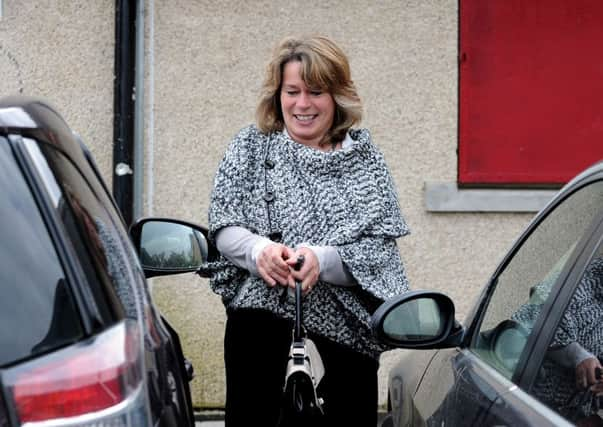Euan McColm: Watchdog looks like kangaroo court


It’s reassuring then, that solicitors are answerable to a watchdog – the Law Society of Scotland – that has the power to punish and even strike off any whose actions fall short of the expected standards.
The Law Society performs an essential role, policing its industry on our behalf; we are expected to have faith that this industry-funded body will, at all times, act independently, without fear or favour.
Advertisement
Hide AdAdvertisement
Hide AdIt’s beginning to look like the Law Society doesn’t deserve the faith it demands from us.
A review of the organisation’s handling of the case of Christopher Hales – a solicitor stuck off for his handling of property deals on behalf of the MP Michelle Thomson, who’s currently suspended from the SNP – was expected to answer a number of very serious questions about its fitness to regulate the industry. Instead, the investigation has thrown up even more serious questions.
When news broke in September that Hales had been stripped of his right to practise law by the society, it seemed astonishing that no criminal investigation had been pursued.
Hales had been struck off in May 2014 over property deals carried out in 2010 and 2011, but the Law Society did not “formally” inform the Crown Office until July of this year (the society “informally” informed the authorities in December last year. Why this “informal” notification did not spark action remains unclear. Notification of the possibility of criminal behaviour is simply that, surely?)
As police began investigating property deals carried out by Hales on behalf of Thomson, attention turned to the Law Society’s role. Why had it taken so long for the Crown Office to be informed?
Then there was the fact that the secretary of the committee that investigated Hales was – and remains – Sheila Kirkwood, a member of the Lawyers for Yes campaign group, known to Thomson. The committee had struck Hales off last year yet hadn’t gone to the police until two months after the general election, which saw Thomson take her place among “the 56” (at the time of writing, “the 54”) at Westminster.
The Law Society called an emergency press conference during which chief executive Lorna Jack succeeded, as chief executives are wont to do, in making things worse.
Jack insisted that Kirkwood had played no role in the delay in the report being passed to Police Scotland and then admitted that no investigation into this possibility had been carried out.
Advertisement
Hide AdAdvertisement
Hide AdAsked about the Law Society’s adherence to its obligation to report any suspicions of criminality to police in accordance with its legal duties under the Proceeds of Crime Act, Jack refused to give details, citing legal confidentiality.
The Law Society’s immediate response to the growing scandal around the Hales case was a masterclass in how to handle a crisis badly. Rather than clarity and openness, there was muddle and apparent obfuscation.
Whether through incompetence or arrogance, the Law Society managed to increase the pressure on itself.
And so the announcement of a review into the organisation’s handling of the Hales case was welcomed (though, by this stage, the society really had no choice but to take such a course. It had begun shredding its reputation and only a rigorous examination of all the facts would do).
By the happiest of coincidences, the Law Society completed its review just in time to release its findings on Thursday while the political hack pack was focused on the implications of the vote to participate in air strikes on Isis terrorists in Syria and the soon to be declared result of the Oldham by-election.
The news was so great that it must have pained the press office to have to release it when it did. The Law Society had done things by the book and there was no suggestion that any member of staff had influenced the delay in the report to the Crown Office.
All well and good, but here’s the problem: the Law Society of Scotland investigated and cleared itself. This is an organisation with the power to strip solicitors of their right to practise and it investigated itself? That is, by any standard, a farce.
What’s more, we do not know who within the society carried out the review, nor how long it took.
Advertisement
Hide AdAdvertisement
Hide AdAll we have to reassure us that the Law Society behaved appropriately over the Hales case is the word of the Law Society. In the circumstances, that simply won’t do.
The society’s president, Christine McLintock, lent her name to a waffling statement in which she spoke of identifying operational improvements that would be taken forward in conjunction with other organisations.
I asked the Law Society if it might send me a copy of the report containing the conclusions it was now making public but was told that it was not available.
Imagine a world in which those investigated by the Law Society were allowed to investigate themselves. It’s completely unthinkable, of course. Their findings would be complete devoid of credibility.
The same applies when it comes to the Law Society. Under no circumstances should it have investigated its own handling of this matter. Any findings are compromised before they’re emailed out by a press officer.
If the Law Society will not now commission an independent review of its handling of the Hales case, then the Scottish Parliament should intervene. The Justice Committee may be able to elicit details that the organisation seems unwilling to provide.
One would imagine that solicitors would support such a move. The Law Society has the power to strip them of their livelihoods and, right now, solicitors might be forgiven for wondering about the quality of justice they might receive in the event of a complaint being investigated.
It exists to regulate professionals and protect the public but, right now, the Law Society of Scotland does not appear fit for purpose. «